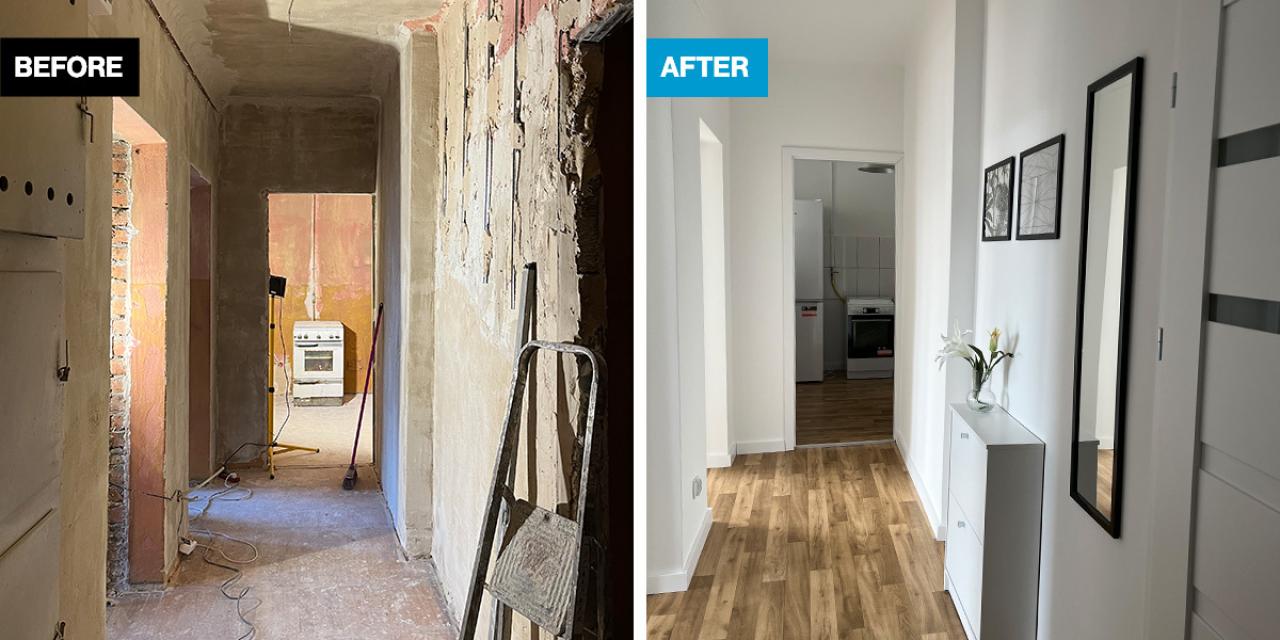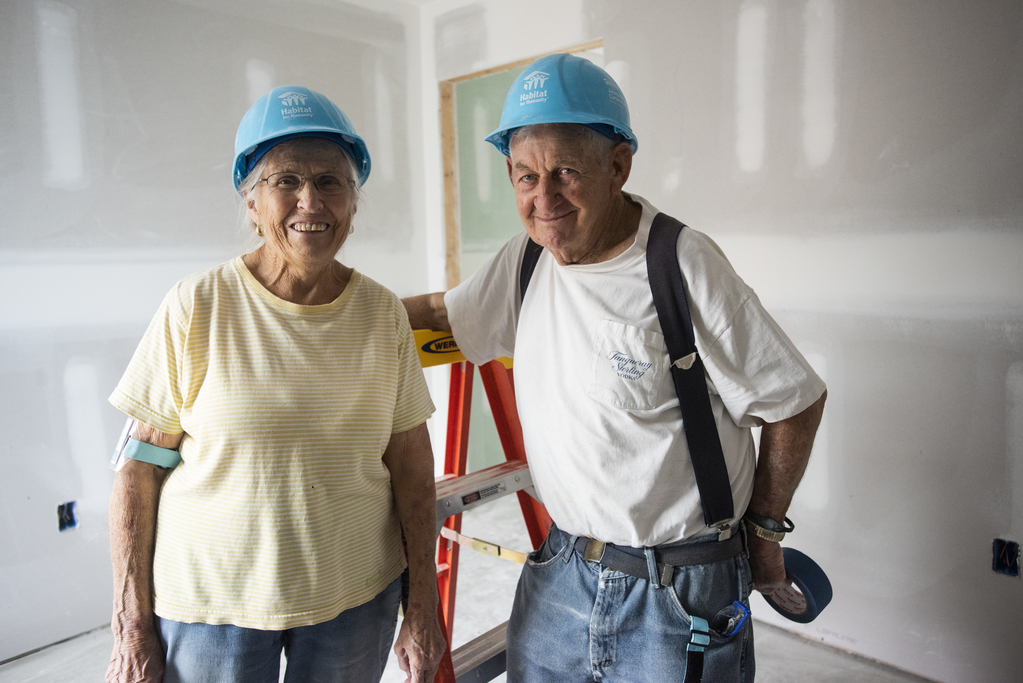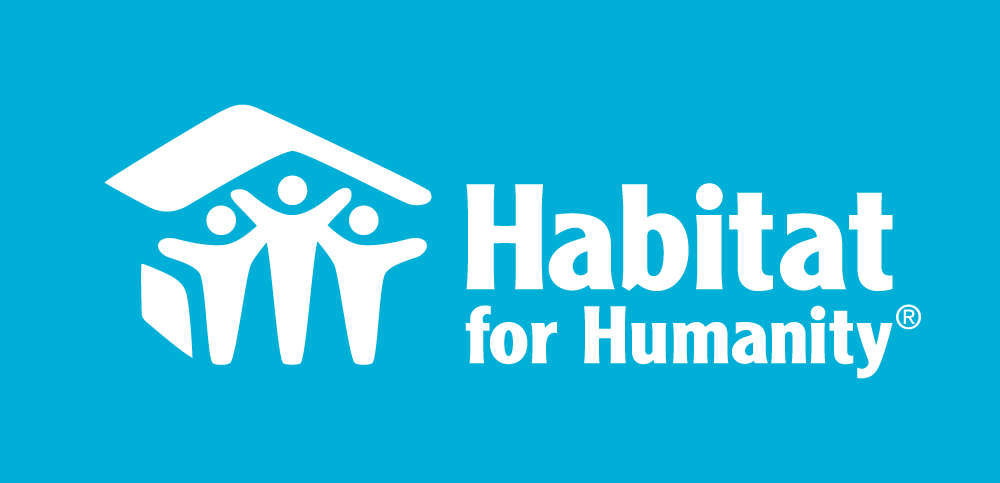Welcome to
The Builder Newsletter
Home is the Key campaign rallies partners and volunteers in Detroit
Each April, Habitat for Humanity’s Home is the Key campaign reminds us of the countless ways homeownership can help families and communities thrive. With the support of generous corporate partners, Home is the Key spurred homebuilding and repair efforts in cities like Detroit, Michigan, where volunteers and supporters joined Angela and Jessica on their journey toward homeownership. “Home is the key to so many things for my family: security, happiness, peace and quiet, love, family, hope, and the list goes on,” Jessica says.
Learn more about Home is the Key on our website.
Converting underutilized spaces into adequate housing
Many cities around the world have a shortage of adequate housing and an abundance of underutilized buildings and empty apartments. Habitat uses innovative and scalable approaches to addressing the global housing crisis, like converting underutilized spaces into habitable places to call home.
Habitat-led pilot projects and research in Hong Kong, Poland and the United Kingdom have shown that reviving empty spaces can be a viable component to increasing the adequate housing stock, particularly in dense urban areas where limited land availability and high construction costs create barriers for development.

Read more
Creating shelter and community space in Hong Kong
In Hong Kong, roughly 220,000 people live in subdivided flats — apartments split into dormitory-like units about the size of a parking space. More than 100,000 residents are in line for public housing, but the slow rate of construction means they can expect to wait an average of 5.5 years.
Habitat Hong Kong partnered with Juan Du, Ph.D., an architecture professor at the University of Hong Kong, to explore housing solutions to accommodate residents as they await public housing. Dr. Du’s research revealed that thousands of temporarily vacant buildings could be used to generate quality housing and community spaces in high-demand areas.
Through Habitat Hong Kong’s Housing in Place pilot project, they worked with developers in 2022 to convert four floors of a vacant building in the city’s Jordan neighborhood into an 8,000-square-foot community center and emergency shelter. Dozens of local nonprofits used the space to hold mental health workshops, provide free legal counseling and host food distribution days. Two of the floors in the converted space were used as a temporary shelter with private beds and other amenities.
Jo Hayes, Habitat Hong Kong CEO, says the center operated for six months and served as a prototype where the government and other stakeholders “could actually see this building conversion in action so that then they would scale that up.”
Reviving empty spaces in the U.K. and Poland
Many European countries face similar housing deficits. In the United Kingdom and Poland, Habitat’s efforts to convert underutilized spaces and renovate empty apartments have helped improve access to adequate housing.
In 2018, Habitat Great Britain and the council of Barking and Dagenham, a borough in east London, partnered to transform an unused storage unit into a four-bedroom apartment that accommodated three young people leaving foster care and a live-in care worker.
The success of the conversion inspired Habitat Great Britain to launch a three-year project in July 2020 to research empty spaces and demonstrate the feasibility of converting buildings into livable units. The project expanded its scope to include empty space conversions and research in Poland led by Habitat Poland.
The research in both countries revealed that local authorities own thousands of empty or underutilized properties.
While conducting research, Habitat Great Britain and Habitat Poland also adapted several empty spaces into flats. In Poland, renovating vacant apartments helped Habitat shelter more families fleeing the war in Ukraine. Mateusz Piegza, Habitat Poland’s program development manager, says they’ve renovated more than 20 flats in Warsaw and Silesia, the majority of which have been rented to refugees.
Scaling building conversions in Europe and across the world
Habitat Great Britain and Habitat Poland each released a toolkit sharing best practices for converting vacant spaces. Their hope is that governments and organizations across Europe will use the toolkits to scale the conversion of empty spaces.
Around the world, Habitat is reimagining affordable housing through our innovative programs. We don’t see a boarded-up building as a vacant space destined for demolition; we see it as an opportunity. By incorporating the repurposing of empty spaces into our scope of work, Habitat is able to help more families open doors to adequate housing.
Learn more about giving from an IRA
Don’t need your IRA retirment savings as much as you once thought? We’ll show you how a Qualified Charitable Distribution (QCD) can benefit you. If you’re 70½ or older and have an IRA, you are already qualified.
Carter Work Project 2023

The 2023 Jimmy & Rosalynn Carter Work Project was hosted by Habitat Humanitarians and country music superstars Garth Brooks and Trisha Yearwood in Charlotte, North Carolina, from Oct. 1-6, 2023.
“Though we could never fill their shoes, we are so incredibly honored to be given the opportunity to carry President and Mrs. Carter’s legacy forward through the continuation of the Carter Work Project,” Brooks said.
Read more about Carter Work Project 2023
The 2023 Jimmy & Rosalynn Carter Work Project took place at Habitat Charlotte Region’s large-scale affordable housing neighborhood, The Meadows at Plato Price. Named after the Plato Price School, this historically significant West Charlotte area was once a thriving African-American neighborhood. Plato Price School closed in the 1960s when desegregation took hold, and the land lay vacant until the city of Charlotte donated it to Habitat Charlotte Region in 2019.
Over five days, future homeowners worked alongside Brooks, Yearwood and hundreds of other volunteers from Charlotte and around the world to build 27 single-family affordable homes.
Habitat Charlotte Region broke ground on the project Sept. 8, 2021. With seven homes already under construction, the entire 39-home project is expected to be completed by early 2025.
To watch the video of this event, please visit our website.

Tell Your Story
Help us celebrate you — the amazing community of partners who shaped our past and continue to build our future.
Request free information about making an impact

 Contact information
Contact information
Sandy Smith (she/her/hers)
Vice President, Collaborative Fundraising, Habitat for Humanity
285 Peachtree Center Ave. NE, Suite 2700, Atlanta, GA 30303-1220 USA
office: (404) 420-6743 • cell: (404) 985-3220
plannedgiving@habitat.org
Every gift can make a difference. Donate online today.
How is this information used?